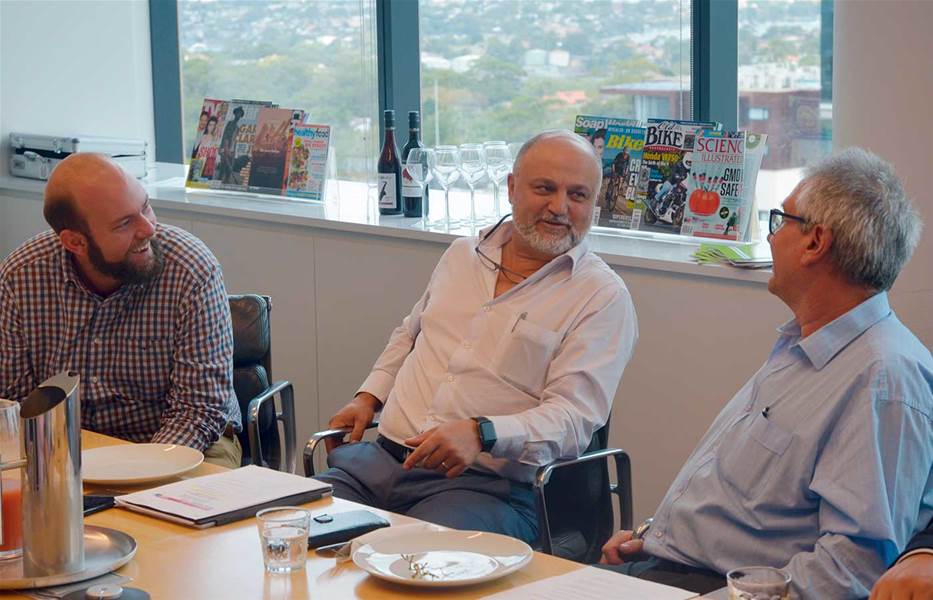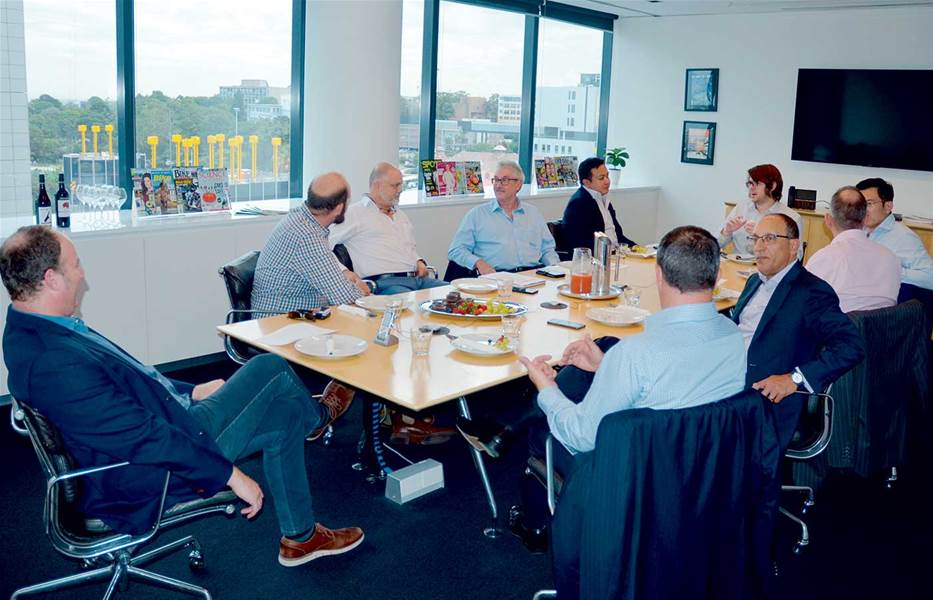A week after the federal budget, and six weeks before the May 18 election, CRN convened a roundtable to ask the channel what they thought of already-announced policies, and what they wanted to hear as the campaign unfurled.
At the time of the event, tax policy had been revealed, but tech policy was in short supply other than some broad brush strokes about skills development, the NBN and the new Take Down of Abhorrent Material Bill.
Which didn’t stop delegates at our roundtable, who had plenty to say about whether Australia’s tech industry – and their businesses – will benefit or suffer under either party.
Do we think that the NBN has been well done and will be fit for purpose? Will it let Australian individuals and businesses tap into digital experiences? Or is it a dud? Do we think anything will change?
Michael Forrest, Forrest Training
The real question is not so much now about the NBN, but when 5G comes to town, how it might actually override the NBN in real terms to a majority of people. Certainly to the household audience.
I remember clearly when Mr Turnbull was Communications Minister, and he was the one who decided we wouldn’t go fibre all through.
The reality is we’ve gone back to copper wire and a mix of this and that, and effectively, the first probably three years of it was just a disaster that nobody knew what the hell to do.
Labor’s announced its new NBN policy, and they’ve given up on new fibre connections. They have announced an intention to rewire 750,000 homes on fibre-to-the-node connections that they think will get a better, more reliable connection after some home cabling improvements.
Yun Zhi Lin, Contino
Just looking at Labor’s announcement, I can’t help but feel it’s very much about the ‘what’. The fibre, whether it’s to the premises, whether it’s to the node. But no one’s looking at ‘how’ is this project actually managed right from the start, top down? Is it a waterfall approach, is it agile, is it actually testing out some hypothesis? Some of these numbers, where did they actually come from? 750,000 households – who came up with that?
Mitch Colton, Colton Computer Technologies
If we talk about this from an economic business point of view, budget included, this is the thing that has real potential to drive business, certainly in regional areas.
NBN was meant to flatten the playing field, and it was meant to give everybody access to a reasonably-priced internet connection of whatever standard that they choose to pay for.

Jason Hall, Dicker Data
One of the things that they talked about is inclusion, focusing on our aging population. And one of the things Australia can’t get away from is the fact that we’ve got an aging population.
If you combine that with the Royal Commission that we’re seeing into residential care, the drive is going to be to look after that aging population in their home. We’re not going to be able to do that without high quality, reliable broadband into those homes, because care is going to be driven by technology, if it’s supported by the government.
What about the new small business rebates? The biggest change is that the instant tax write-off policy now applies to companies with up to $50 million in revenue. The threshold for purchases has also increased to $30,000. Do we think that this will stimulate IT buying?
Moheb Moses, Channel Dynamics
For me, the most significant thing is not the increase from $20,000 to $30,000, it’s the increase from $10 million to $50 million. That is a more significant shift in policy, because now it’s exposed to a whole lot more folks.
Now, will that accelerate spending? I don’t know that it will, because this continues on until mid-2020. Here we are now in April, and we’ve got three months and most people have their budgets. I certainly think it’ll have an impact next year. I wonder how many businesses are in a position to go, “Hey, let’s go spend $300,000 on new PCs.”

Mitch Colton
I think you’re right in that the raising up from $10 million to $50 million will make a difference.
The first year it came in, we saw people bring purchases forward. Stuff that they’d budgeted for the future, they just went, “Oh, sweet, we’ll just do it now.”
John McVicker, Best Technology Services
That’s the only part about the budget that’s sort of IT friendly, really, isn’t it? Because it doesn’t focus on innovation. It doesn’t focus on productivity. No reference to digitalisation or forward working, and it’s all about just where can we shove as much money into people’s pockets as possible.
Jason Hall
Labor talked about innovation in developing local capability to recycle it here and turn into something that’s useful, worthwhile, that’s got some return on it. And they talked about it being made in Australia.
Now, yes, maybe it’s just fluff, but if we’re looking for snippets of innovation out of either of them, that was something that struck me as a) bloody good idea, and b) could help us as an industry, as a nation, to drive technology around green technology, around recycling technology, because we’ve got the smarts.
It doesn’t feel like the governments are supporting us to come up with... Maybe not the next Atlassian, right, but build out our local technology and support the local technology industry.
Tony Khoury, Pitek
We’ll never know what the next Atlassian is, because no one’s got the ability to start.
Yun Zhi Lin
There are various kind of incentives around STEM: encouraging gender equality, encouraging more diversity in the workplace, a skills package – I think $62 million to up-skill around digital innovation games, which is testing new entrepreneurs on real business problem. It’s all great. On one hand, you can see the budget really kind of pushing for digital innovation, entrepreneurship, and the next Atlassian, but on the other hand, there’s $4 billion cut from the innovation fund over the last two budgets.
So I think the government really is compromising a bit, and trying to draw a balance between lifting up new entrepreneurs but then also trying to take the money from somewhere.
What does the group think about the skills development and skilled migration policies we’ve seen so far?
Michael Forrest
The current push for STEM stems from no understanding in our federal and state governments of what skills we are lacking in those areas, to start off with. Australia hasn’t actually done an audit to understand any idea of what people at school, at university are taught on the STEM curriculum.
The whole VET sector is faulty. We can’t get to where we want to go without better-skilled people in the business community and that comes from the school system.
Mitch Colton
We have taken six or eight work placement kids, from every high school in the area we can get. We’d train them and give them a $40,000-a-year job once they finish high school, which is guaranteed for 12 months. While some end up just taking that gap year before heading off to university, we still get a 50 percent success rate of keeping them after that 12-month period.
What we’ve seen in our segment is that when the 457 visa program ended, a lot of senior, very skilled specific talent exited Australia.
It’s really about identifying the right skill set at a national level. Government policy would help to increase the pool of skilled candidates around information technology, entrepreneurship, IT management and opening up the doors of immigration to allow it.
Yun Zhi Lin
It’s really about identifying the right skill set at a national level. When I look at the immigration list of skill shortages, it mentions accounting, hairdressing and the like but not information technology, entrepreneurship, IT management – they are not on the list, and we really have that shortage here in Australia.
While we were trying to grow our staff, we had to ‘poach’ some people from startups and pay above-market rates at the beginning. It eventually got more expensive and more difficult as we also grew our clientele.
Policy would definitely help if the government was to increase the pool of skilled candidates and open up the doors of immigration to allow it.
Jason Hall
The skills we need include highly specialised people, who are capable of very specific implementations using quite high-end technology. Immigration and visa programs would definitely help, but we also have a requirement for entry-level staff with an IT technology perspective, as well as product managers and people for marketing and staging.
That’s where policy can help us, since it’s quite difficult to find competent, well-rounded entry-level people. Whether it’s VET, TAFE or university, having greater integration between what industry wants from an entry level, and what the education system ensures that young people are getting jobs quicker as they leave school.
What we’re after are people who can go hands-on with a switch. At the moment the focus seems to be on coding – and while there’s absolutely a place for that, a lot of us deal with the physical manifestation of IT, like boxes.

John McVicker
We’ve also got a demographic issue. There has been a decline in the working population due to a decline in Australian birth rates. It only started to climb back up when John Howard introduced the baby bonus, which created a gap.
That’s exacerbating a serious problem, because unless we’ve got the technical skills, or where we’ve got people who are interested in technology, in an age where there is going to be large digitalisation, created by the fourth industrial revolution, then we’ve got serious problems.
Every OECD country has had to import talent, since most of them have declining populations and growing economies, so that imbalance has to be addressed somehow. The problem is we’re scared of importing talent - we canned the 457 program because people were abusing it and it’s to our detriment because there is nothing suitable to replace it.
Michael Forrest
CompTIA ran these successful courses in some TAFEs, but when they got ‘kicked in the guts’, the courses were eventually dropped. It was actually a good breeding ground for bringing young guys into the workforce – for women and men.
However, there’s a disconnect when it comes to getting people into real work. TAFEs have the resources and the support, but the industry needs to be in contact with the government and let them know that there’s a missing link somewhere and they are going to do about it. We’ll need an ongoing voice to keep that connection going, and we should be at the table.
Australia famously passed the crypto bill and the recently passed Take Down of Abhorrent Material Bill. Do the policy settings feel right overall to run an industry and grow an industry?
Mitch Colton
There’s been a lot of knee-jerk policy stuff, and it’s not necessarily limited to Australia because the IT industry is about 75 years tops. Accountants, solicitors and medicos have got hundreds, if not thousands of years of institutional precedent and history and whatever, and I think that those industries don’t know how to react to IT, because IT does not have that history behind it.
Tony Khoury
But to be fair to the governments of the world today, IT is challenging so many things about what we know, and we have to believe their intentions are good and reasonably well-informed. We’re entering new grounds on law, we’re entering new grounds on our version of prohibition.
Yun Zhi Lin
During the 2008 global financial crisis, my experience was that CEOs of investment banks and fund managers were consulted on whether they should stop shorting or not. But with the crypto bill, who was actually consulted? Was there a consultative process with some of the experts in encryption? I mean, you’re either encrypted or you’re not, right?
With the education and the skill shortages, and these policies around encryption, it just seems to be a disconnect. There should be more research and consultation with the experts and the customers who will be receiving these sort of policies and services.
Is there a particular policy idea that you feel would make a positive difference to your own business, and to the wider industry?
Jason Hall
I’d like to see the alignment of school leavers, TAFE leavers, university leavers and what they’ve learnt and experience they’ve had, translate into a relatively smooth entry into the industry.
Moheb Moses
One of the challenges is the average student today doesn’t want to do three or four years at university to go and fix servers. So there’s got to be a shorter pathway.
Another challenge is to get someone to actually do these apprenticeship-type short pathways.
I actually meet sales people working in coffee shops, and I go, “You would be fantastic in our industry.” But if you mention that to them, they go, “Yeah, I don’t know a thing about computers.”
Before we can even get them to an apprenticeship, we’ve got to get them to go, “I’m interested in this as a career.” And I think there’s actually a role to play in that.

John McVicker
What’s missing for me is a massive investment in education around technology.
In 20 years time, 40 percent of the jobs that exist today won’t exist, because of technology. And there’s no recognition of that at all, and I think that’s to our detriment.
Yun Zhi Lin
The government should start working with the consumers to build up trust in the system. A lot of the initiatives that they’re rolling out will impact us, because we have a potential to work on some of these aspects and it’s quite exciting, but the question lies in how they would actually roll it out.
Get the people to trust the system, because the trust is theoretically correlated with the experience and reliability of your system.
Michael Forrest
We need to go back to the grassroots of the government running the education of this country. They need to do an audit and an understanding of what they think is going on and then they need to go to the government institutions and private institutions to engage with what is really happening.
An IT apprenticeship would be fantastic. It would be creating that opportunity for the jobs that don’t exist in three years.
The industry’s changing so much, and we just need to have the core competencies and the education to back those, to be able to deliver very quickly.
Tony Khoury
I invested in this local startup, but we’ve come to realise we may be forced to take it overseas. There’s no real path in the government to support that level of entrepreneurship in my opinion. Not that I can see at the moment.
Mitch Colton
I’ve had the idea of IT ‘apprenticeships’ since I was 18, at a time when a lot of my peers were doing one for trades. I did my ‘unofficial apprenticeship’ with a former company CIO by following him around.
That’s the approach we’ve taken internally and it’s worked fantastically.
DELEGATES
Jason Hall
General Manager Services and IoT, Dicker Data
Michael Forrest
Director, Forrest Training
Mitch Colton
Managing Director, Colton Computer Technologies
John McVicker
Founder and Managing Director, Best Technology Services
Moheb Moses
Co-Founder and Director, Channel Dynamics
Tony Khoury
Managing Director, Pitek
Yun Zhi Lin
Head of Engineering, Contino
FACILITATED BY
Brendon Foye
Journalist, CRN
Nico Arboleda
Journalist, CRN
Simon Sharwood
Editorial Director, CRN






.jpg&h=142&w=230&c=1&s=1)
_(21).jpg&h=142&w=230&c=1&s=1)
.png&h=142&w=230&c=1&s=1)



.jpg&w=100&c=1&s=0)
_(8).jpg&w=100&c=1&s=0)











